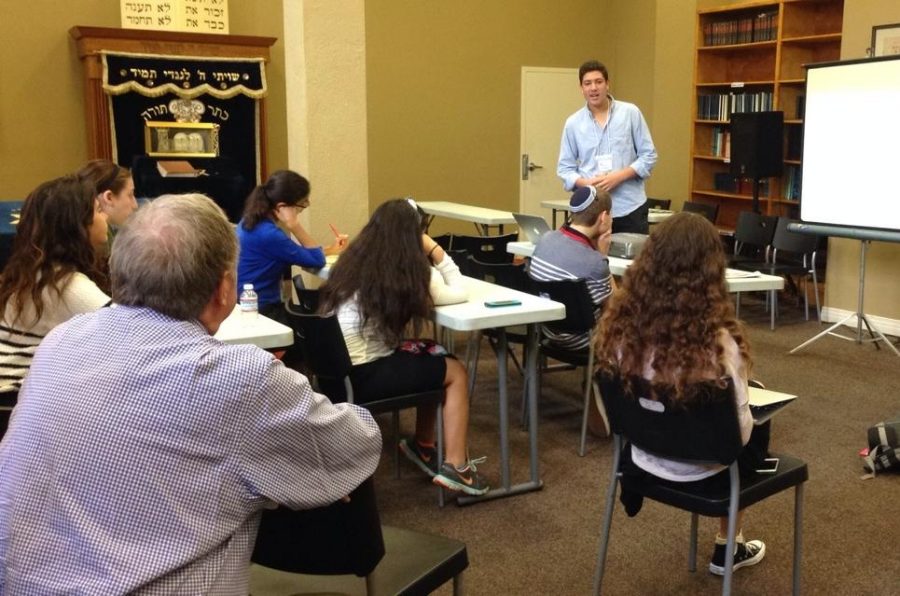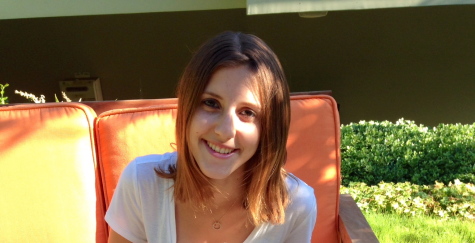Judea Pearl challenges students at JSPA conference
CONSTRUCT: Torah Editor Noah Rothman teaches students how to create a successful Torah Section at the JSPA Conference.
December 2, 2014
If a Jew whose family hasn’t lived in Israel for over 2,000 years can easily and legally make aliyah, then why can’t an Arab whose family lived there until 1948 do the same?
At Shabbat dinner on Oct. 31, Dr. Judea Pearl posed this question to students in his keynote address to the Second Annual Convention and Shabbaton of the Jewish Scholastic Press Association, held at Bnai David-Judea Congregation on Pico Boulevard.
“This is the question you will be asked by thoughtful, liberal people on college campuses,” Dr. Pearl told an audience representing four high schools from as far away as Memphis, Tenn.
In that situation, he said, it wouldn’t help to reply that the land was given to you by God.
Students were speechless and did not know how to answer. After an awkward minute or so of silence, Boiling Point Editor-in-Chief Alexa Fishman asked Dr. Pearl how he would answer it himself.
He said he would explain that Arabs and Israelis are “equally indigenous” in the land, and back that up with the additional information that a right to something is based on an expectation – the expectation of a free public education, for example, or to be allowed to vote. Jews have always expected a return to Israel, he said, as expressed in songs, prayers and even holidays.
The students in attendance were surprised by Dr. Pearl’s suggestion.
“That’s a very secular thing to say,” said BP Managing Editor Goldie Fields in an interview later. “I think that first and foremost, we are a religion, and from our religion we’ve grown and formed a culture and a nationality, but that all started from our being a religion.”
Dr. Pearl, who is the father of the slain Wall Street Journal reporter Daniel Pearl, z”l, and a UCLA professor of Computer Science, was a keynote speaker at the conference, which ran from Oct. 30 through Nov. 1.
Also in attendance at the dinner were students or faculty from Margolin Hebrew Academy of Memphis; Daniel Pearl Magnet High School in Encino; and Harvard-Westlake School in North Hollywood, along with Executive Editor Susan Freudenheim of the Jewish Journal and C. Bruce Watterson, Chief Judge of the Crown Awards of the Columbia Scholastic Press Association.
The conference was cosponsored by Shalhevet and the American Jewish Press Association, an organization of Jewish papers and journalists from around the U.S. and Canada.
In his address, Dr. Pearl described his son’s friendliness and love of strangers, recounting a time when he had brought a Bulgarian street musician with him to a dinner London. There and in Pakistan, where he was ultimately murdered by Al Qaeda, Daniel Pearl got along with everyone and would respond to casual anti-semitism by stopping it – sometimes saying something like, “Hey wait – I’m Jewish,” his father said.
On one such occasion shortly after the 9/11 attacks, Dr. Pearl said, his son was at a dinner in Pakistan, and one of the guests was an Al Qaeda sympathizer. Daniel Pearl made his usual comment, the room went briefly quiet, and a few weeks later, he was captured and killed after traveling to interview an Al Qaeda representative in Karachi.
Other speakers at the JSPA conference included reporters from the Jennifer Medina of the New York Times; Rob Eshman and Susan Freudenheim of the Jewish Journal; and three advisers from the Harvard-Westlake Chronicle, as well as attorneys and experts on copyright, student press law, photojournalism and page design.
Rabbi Yosef Kanefsky of Bnai David-Judea spoke about the new media’s responsibility to prevent harm.Mr. Eshman described Jewish media coverage of the recent Gaza war, and attorney Joseph Lipner spoke about freedom of the press in religious high schools.
On Thursday, a workshop appeared to intrigue writers as they took notes and asked questions about investigative reporting from Harvard-Westlake’s Jenny Hontz, who had covered many scandals during her journalism career.
The next day, Shalhevet junior Noah Rothman gave a talk on how to create a Torah section.
Later, students sat in a circle with Karmel Melamed of The Jewish Journal and Jennifer Medina of The New York Times to discuss diversity in the newsroom. Ms. Medina noted that diversity among reporters is essential in order to produce an understanding of more viewpoints, and also to bring to light stories that would otherwise go unreported.
Mr. Melamed, who covers the Iranian community in Southern California, explained that many Persian families are afraid to speak to journalists because of their experiences in Iran, or in leaving Iran. He explained how he convinced some in Los Angeles that news coverage could be a good thing, in spite of their past experiences.
In another workshop, The Boiling Point’s layout staff huddled around Bruce Watterson, who critiqued the newspaper’s layout and offered to improve their design.
“Mr. Watterson gave us advice that will definitely benefit our paper,” said layout editor Michelle Hirschhorn. “He told us to create more white space so that the reader really has room to concentrate on each article.”
On Saturday afternoon, students ate lunch and schmoozed at Bnai David, and while munching on desserts, conference organizer Mrs. Joelle Keene presented the students with a moral dilemma: whether a theoretical high school journalist should report about a college counselor who rounded up students’ grades.
“My favorite part of the JSPA experience was hearing the different view points of various renowned journalists,” said Rena Mashinsky, Editor of GMSG Weekly, the online paper for Goldie Margolin Girls’ High School in Memphis.
Before the conference, students submitted their entries for the Second Annual Jewish Scholastic Journalism Awards. Noah Rothman won first prize, Margo Feuer and Eric Bazak received second and Jessica Spitz of Harvard-Westlake came in third.
There were fewer students at the conference than last year. Mrs. Keene thought it was because the timing of the chagim moved the conference date closer to the college application deadline.
“I think we were caught in the calendar,” said Mrs. Joelle Keene.
She said she would consider moving the conference to early February to attract people from the East Coast, who might want to enjoy LA’s winter weather.














